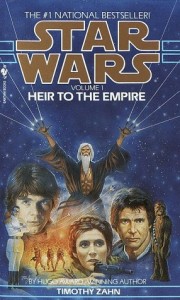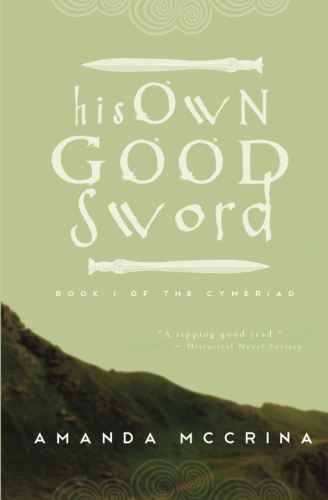Some Facebook friends and I recently had a discussion sparked by an article posted on Tor’s Star Wars site. The author puts forth the argument that Timothy Zahn’s 1991 novel Heir to the Empire  moved Star Wars out of the realm of space fantasy and into the realm of true science fiction, setting the genre boundaries for the later Expanded-Universe novels. While I agree that Zahn’s work had a profound influence not only on the EU but on the franchise in general, I don’t think the author succeeds in making his case—Zahn’s work didn’t make Star Wars any more science-fictional than it already was.
moved Star Wars out of the realm of space fantasy and into the realm of true science fiction, setting the genre boundaries for the later Expanded-Universe novels. While I agree that Zahn’s work had a profound influence not only on the EU but on the franchise in general, I don’t think the author succeeds in making his case—Zahn’s work didn’t make Star Wars any more science-fictional than it already was.
Really, only two of the author’s points directly address his thesis. He argues that the ysalamiri* cast the Force in a more scientific light; rather than a spiritual power, the Force becomes a natural phenomenon that may be neutralized by another natural phenomenon. And he points out the centrality of cloning to the plot of the Thrawn Trilogy. His other points—that Zahn introduces a strong female character in Mara Jade and spends time discussing “space politics”—don’t really lend much to his argument.
Of the two points, I feel only the cloning argument holds much water. Despite the ysalamiri, Zahn still never really presents the Force in scientific terms. And the cloning alone isn’t enough, in my opinion, to make Heir to the Empire “hard science fiction” (the article suggests it is such), or even to make it more science-fictional than the films—after all, Obi-Wan mentions the Clone Wars in Episode IV. (Incidentally, it’s interesting to note that both cloning and a quasi-scientific interpretation of the Force resurface in the prequel trilogy.)
Our discussion did raise the question of what “science fiction” really is. Leaving the article aside, does Heir to the Empire qualify? If you strip “science fiction” down to its barest definition—fiction about science—then I’d argue it does, since it revolves around scientific concepts: space travel, cloning, et cetera. But does the definition of “science fiction” really stop there? The point was raised, in our discussion, that sci-fi should address the human condition on Earth by presenting what-if scenarios that force us to think about what it means to be human. (I recently read an article on dystopias that said much the same thing about dystopian fiction: it exists to give us a platform to address real-life social issues.) Ender’s Game does this; 1984 and Brave New World do this. Zahn’s books really don’t. If this is the criterion for determining science fiction, Heir to the Empire doesn’t meet it.
I’d contend that while this doesn’t have to be the criterion for qualifying science fiction, it should certainly be the criterion for qualifying great science fiction—just as it should be the criterion for great fiction of any sort, regardless of genre. It’s what elevates something like Brave New World to the pedestal of classic literature. As much as I love Heir to the Empire, I wouldn’t claim it reaches the same heights.
*“Creepy little slugs who negate the Force,” according to the author of the article. Sort of like Jedi Kryptonite.

 I'm a student, amateur historian, coffee connoisseur, movie buff, hockey fan, cat lady, and all-around nerd. I'm currently pursuing a degree in history and political science at the University of West Georgia. In my spare time, I write historical fiction and fantasy. My debut YA historical fantasy novel His Own Good Sword was released on 7 May 2013.
I'm a student, amateur historian, coffee connoisseur, movie buff, hockey fan, cat lady, and all-around nerd. I'm currently pursuing a degree in history and political science at the University of West Georgia. In my spare time, I write historical fiction and fantasy. My debut YA historical fantasy novel His Own Good Sword was released on 7 May 2013.


